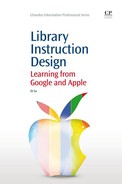Appendix 2
The Library Instruction Program: A Plan for Information Literacy at Oglethorpe University
Introduction
Information literacy, the ability to access, evaluate, and incorporate information effectively, is an essential component of a liberal arts education. As a liberal arts institution, the mission of Oglethorpe University is to teach students “to make a life, make a living and make a difference,” and thus “become community leaders who are distinctive in their ability to think, communicate and contribute.”1 In support of the University’s mission, the staff of the Philip Weltner Library assist students in gaining information literacy skills in a variety of ways, including assisting with research requests, the library orientation program, and instruction sessions on a variety of resources. Course specific library instruction sessions are also available as further means of developing effective skill sets.
Additional resources for developing information literacy skills include course specific subject guides, as hosted on the library website, information on plagiarism, and online tutorials. The library also houses the campus writing center, a recent addition to the resources designed to assist in effective use of information.
The Association of College and Research Libraries (ACRL) has adopted a set of guidelines and standards addressing information literacy competency. As the ACRL states, “an information literate individual is able to:
■ Determine the extent of information needed
■ Access the needed information effectively and efficiently
■ Evaluate information and its sources critically
■ Incorporate selected information into one’s knowledge base
■ Use information effectively to accomplish a specific purpose
■ Understand the economic, legal, and social issues surrounding the use of information, and access and use information ethically and legally.”2
Library Instruction Program
The Library Instruction Program (LIP) of the Philip Weltner library serves as one means of providing an information literacy experience designed to build expertise in mining the wealth of resources available to members of the 21st century college campus. The Library Instruction Program is composed of three components: the Library Orientation Program, the Continuing Instruction Program and the Web-based Learning Program.
The Library Orientation component of LIP correlates directly to the campus wide Quality Enhancement Program (QEP), which was developed in 2005–2006. The QEP provides a framework in which to make the first year student experience successful. The Library Orientation Program is designed to meet three specific goals centered on the campus QEP:
■ Provide and support specific instruction for the First Year Experience
■ Provide a formal library orientation program for incoming students
Through the Continuing Instruction Program and the Webbased Learning Program, the library offers instructional sessions and online tutorials designed to meet the information literacy needs of faculty, staff, and students.
Mission Statement
The Library Instruction Program (LIP) serves directly the students, faculty and staff of Oglethorpe University. The program is designed to assist participants in finding, analyzing, and applying sources of information appropriate for their individual learning experience.
Objectives
The objectives of LIP are the same as those outlined by ACRL in defining the information literate individual who is able to:
■ Determine the extent of information needed
■ Access the needed information effectively and efficiently
■ Evaluate information and its sources critically
■ Incorporate selected information into one’s knowledge base
■ Use information effectively to accomplish a specific purpose
■ Understand the economic, legal, and social issues surrounding the use of information, and access and use information ethically and legally.3
Program Design
A suite of services fulfills three separate programs: The Library Orientation Program, Continuing Instruction, and Web-based learning. Within the Library Instruction Program participants will learn various information literacy concepts. The following chart outlines information literacy concepts that may be covered throughout LIP.4
The Library Orientation Program is closely related to the first year experience of Oglethorpe students and provides a means of building the skills required for successful introduction into the realm of academia. The Program provides a quick introduction to the library’s operations and services. Additionally, a short research assignment has been designed to provide immediate immersion in the art of database searching. An introduction to study skills and issues of academic integrity completes the Library Orientation Program. Program emphasis includes:
Continuing Instruction offers a series of classes designed to meet both the basic needs for mining the online resources and customized classes for course specific research. The library offers a series of classes in “online research.” Continuing Instruction classes may include, but are not limited to:

The classes are open to all members of the campus. Customized classes are available upon request.
Web-based Learning includes a robust design of services available through the Library Homepage. Tutorials and online information together create a variety of research related information opportunities, including “ask a librarian,” time management skills, and a plagiarism tutorial. PowerPoint presentations and handouts from the various Continuing Instruction classes will be available on the Library page as well. Additional research information is also provided on the archives page, and includes access to images and collections.
Assessment
Assessing the outcomes of the Information Literacy program is one of the main objectives for achieving an effective program. The library instructors provide assessment tools for all learning based sessions and consult with faculty who maintain expertise in assessment.
In addition, the LibQUAL survey is a component of the overall library assessment program. The next LibQUAL survey is scheduled for 2008.
Staff and Staff Development
The Library Instruction Program is a design of the reference services librarians. Through continuing education and staff development they provide an up to date response to the growing needs of the computer based learning experience as well as the traditional research experience. The librarians provide constant attention to placing the resources of the Philip Weltner Library in the forefront of the campus based learning needs. These include but are not limited to the following components of the library:
■ Online serials and periodicals
■ Vast array of consortia provided e-resources
[Courtesy of Philip Weltner Library, Oglethorpe University, Atlanta, Georgia, U.S.A. Updated 10/3/06.]
